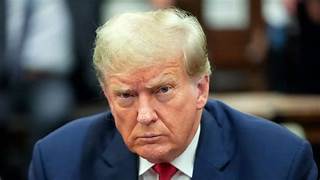
Trump Furious as Rebel House Republicans Refuse to Back ‘Big Beautiful Bill’

 :
| Updated On: 03-Jul-2025 @ 1:44 pm
:
| Updated On: 03-Jul-2025 @ 1:44 pmSHARE
The U.S. House of Representatives is facing a major political standoff over former President Donald Trump’s flagship tax and spending package, the “One Big Beautiful Bill.” This critical legislation, spanning 800 pages, serves as the centerpiece of Trump’s domestic policy. It includes massive tax cuts, increased spending on defense and border security, and significant reductions to social safety net programs such as Medicaid.
However, the bill is in jeopardy due to internal divisions within the Republican Party. While all Democratic members are firmly opposed to the bill, a small but crucial group of Republican lawmakers have either voted against it or withheld their votes, effectively blocking its progress. So far, five Republicans — Victoria Spartz (Indiana), Andrew Clyde (Georgia), Keith Self (Texas), Brian Fitzpatrick (Pennsylvania), and Thomas Massie (Kentucky) — have voted “no” in the procedural stage. Eight other Republicans have yet to cast their votes, creating uncertainty around the bill’s future.
Trump, who is relying on the success of this bill to boost his policy legacy and rally support ahead of the 2024 election cycle, took to his Truth Social platform to express his frustration. He labeled the bill a historic opportunity for tax cuts and economic growth, criticizing Republicans for not uniting behind it. “For Republicans, this should be an easy yes vote. Ridiculous!” he wrote, adding that “MAGA is not happy, and it’s costing you votes.”
The bill’s opponents within the Republican Party are split into two camps. Moderates have raised concerns over the impact of the proposed cuts to social programs, particularly for vulnerable populations. On the other hand, fiscal conservatives are alarmed by the massive increase to the national debt the bill would trigger, given its high levels of spending.
The Republican leadership, including House Speaker Mike Johnson, is under intense pressure to rally the votes necessary for the bill’s passage before the July 4 Independence Day deadline. The urgency was amplified after the bill narrowly passed in the Senate on Tuesday with a 51-50 vote, thanks to Vice President JD Vance breaking the tie. Johnson called lawmakers back to Washington for a roll call vote to quickly approve the Senate version of the bill and send it to Trump’s desk.
Despite this push, the vote has encountered significant resistance. Johnson pledged to keep the vote open “as long as it takes” to persuade the remaining holdouts. He expressed cautious optimism that Republican dissenters would eventually fall in line, allowing for a final vote early Thursday morning.
Meanwhile, Democrats have intensified their opposition. Representative Chuy Garcia, in a video message, denounced the bill as a “bad bill to enrich those who are already rich,” criticizing it for disproportionately benefiting the wealthy while threatening key public services.
As it stands, 217 House members have voted against the bill, with 207 in favor. Since 218 votes are required for the legislation to advance, the outcome hinges on the votes of the eight undecided Republicans. Members are allowed to change their vote until the voting period closes, leaving the bill’s fate uncertain as intense political maneuvering continues on Capitol Hill.